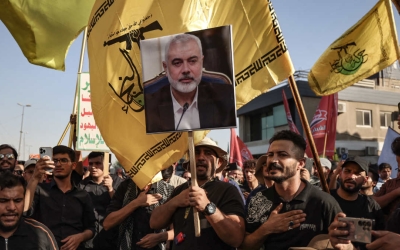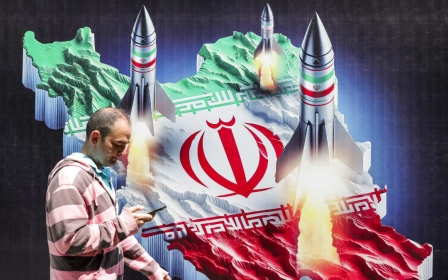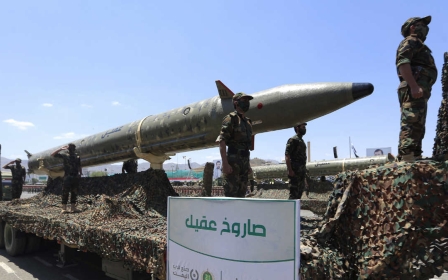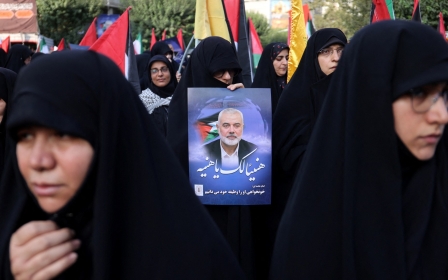US officials brace for Iran's 'axis of resistance' to spearhead retaliation to Haniyeh killing
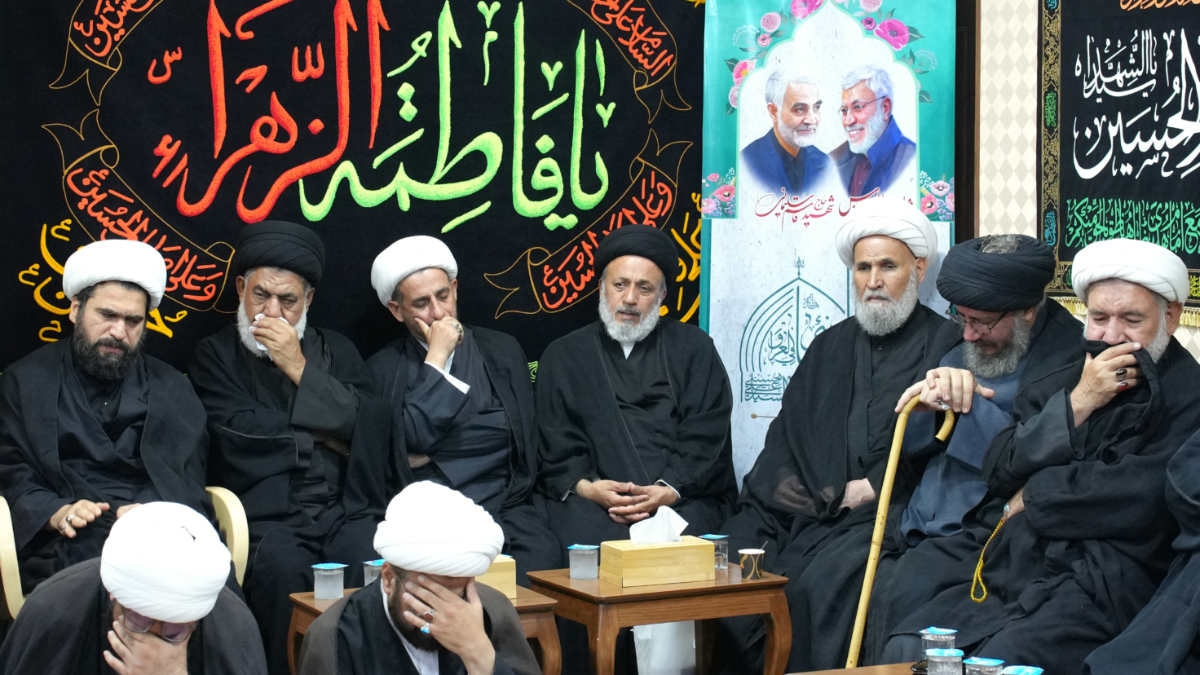
The US anticipates Iran’s so-called "axis of resistance" to take the lead in retaliating against Israel for assassinations in Tehran and Beirut, a move that could signal Iran wants to de-escalate tensions but also injects a new layer of uncertainty to US war gaming.
The US is particularly on alert to Iran’s proxies from Yemen, Iraq and Lebanon carrying out coordinated attacks on Israel, a US official told Middle East Eye, adding that the US is combing signals intelligence and conducting cryptographic analysis to see how the groups are organising themselves.
“Iran’s proxies are expected to play a more prominent role in this retaliation than April’s attack,” a former senior US official familiar with the administration’s thinking told MEE. “We could get into a situation where the tit-for-tat is more unpredictable with tertiary effects for US partners.”
Israel delivered two humiliating blows to Iran’s "axis of resistance", assassinating senior Hezbollah commander Fuad Shukr in Beirut on Tuesday and then allegedly killing Hamas leader Ismail Haniyeh at a Tehran apartment complex controlled by Iran’s Islamic Revolutionary Guard Corps.
The strikes, particularly the killing of Haniyeh in Tehran, have embarrassed the Islamic Republic and its allies across the region. On Thursday, Hezbollah leader Hassan Nasrallah said a response was “inevitable”, warning Israel: "You do not know what red lines you crossed.”
New MEE newsletter: Jerusalem Dispatch
Sign up to get the latest insights and analysis on Israel-Palestine, alongside Turkey Unpacked and other MEE newsletters
While the attacks have plunged the region into uncertainty, the Biden administration does have a model to replicate as it girds for Iran's response.
In April, the region was also on the brink, after Israel bombed Iran’s consulate in Damascus. The strike was seen as a direct attack on Iranian sovereign territory and distinct from the recent assassinations that didn't target Iranian nationals.
In a joint effort with Jordan and the UK, the US shot down almost all of the 300 missiles and drones Iran fired at Israel. It then convinced a resentful Israel to respond with a small drone strike on Isfahan.
“The [April] attack was largely seen as a humiliation in Iran because it was foiled so successfully by the US,” Merissa Khurma, director of the Middle East programme at the Wilson Center, told MEE.
'Not a performative response'
Iran telegraphed its retaliation days in advance and warned the US’s Arab Gulf partners about an incoming attack on Israel, which likely helped the US and Israel prepare. The backchannels to Gulf states appear to be kicking in again. Iran’s acting Foreign Minister Ali Bagheri has spoken with his Saudi, Omani and Qatari counterparts.
But there are also signs that Iran’s last strike on Israel may have been too choreographed and calibrated.
"We are looking for a real response, not a performative response, and for real opportunities,” Nasrallah said on Thursday.
Khurma said that Washington felt vindicated by its handling of April’s flare-up. “There is a little sense of riding it out this time,” Khurma said. “But they need serious backchannel diplomacy to avert a regional war.”
The US’s Arab Gulf allies pushed back against taking an active role in Israel’s defence in April. In the end, the US scrambled fighter jets from Qatar and Saudi Arabia to shoot down Iranian drones and missiles, but US officials were frustrated with Gulf foot-dragging.
“The US partners, especially in the Gulf, are fatigued by the Gaza war and want a ceasefire."
Will proxies pay the price?
If Yemen’s Houthis take a prominent role in the retaliation, it could unnerve Saudi Arabia.
A Houthi drone strike slipped through Israel’s air defence systems in July, killing one person. Israel bombed Houthi-controlled Hodeidah port in retaliation. Afterwards, Yemen’s Saudi-backed government relaxed financial restrictions on the group, underscoring how it has tried to stay on its good side.
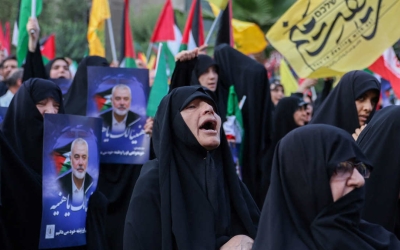
US Secretary of State Antony Blinken spoke on Thursday with Saudi Foreign Minister Prince Faisal bin Farhan about reducing the chances of escalation in the region and reaching a permanent ceasefire in Gaza.
A more diffuse Iranian response could also draw in the Popular Mobilisation Forces. The Iran-backed collection of Shia militias mainly sat out April’s spike in tensions. But their attack on a US military base in Jordan earlier this year almost brought the US and Iran to blows.
The New York Times reported on Thursday that Iran’s supreme leader, Ayatollah Ali Khamenei, ordered a direct Iranian attack on Israel. But the question for analysts - and the US - will be the extent of Iran’s direct involvement compared to its proxies.
“If Iran strikes Israel directly, Israel will be compelled to respond on Iranian soil. Iran wants its proxies to pay the price this time, which would also be more acceptable to Israel and the US,” Ali Alfoneh, an expert on the Islamic Revolutionary Guard Corps, at the Arab Gulf States Institute, told MEE. “That would be a wise move.”
The US is Israel’s closest ally. In addition to coming to Israel’s defence in April, it is providing intelligence to help Israel find and kill Hamas’s Gaza chief, Yahya Sinwar, and is ensuring a steady supply of arms for its military.
But the US has also tried to position itself as a restraining force, working to seal a ceasefire deal.
The Biden administration has stated its goal is to prevent the war from seeping beyond Gaza, and Secretary of State Antony Blinken quickly distanced the US from the Haniyeh strike, saying: "This is something we were not aware of or involved in.”
There are signs that Israel’s audacious assassinations in Beirut and Tehran are grinding down any perception that the US can control Israel, thereby reducing the weight of what US officials say in backchannel diplomatic talks, which will be necessary to de-escalate tensions.
US officials had warned their Lebanese counterparts that Israel would conduct strikes in the east and south of Lebanon in retaliation for a deadly attack on the Israeli-occupied Golan Heights. Israel’s strike on Beirut appeared to catch Hezbollah off guard, with Shukr killed in the upper floors of an apartment building.
"We were not expecting them to hit Beirut and they hit Beirut," Lebanon's Foreign Minister Abdallah Bou Habib told Reuters.
Middle East Eye delivers independent and unrivalled coverage and analysis of the Middle East, North Africa and beyond. To learn more about republishing this content and the associated fees, please fill out this form. More about MEE can be found here.


